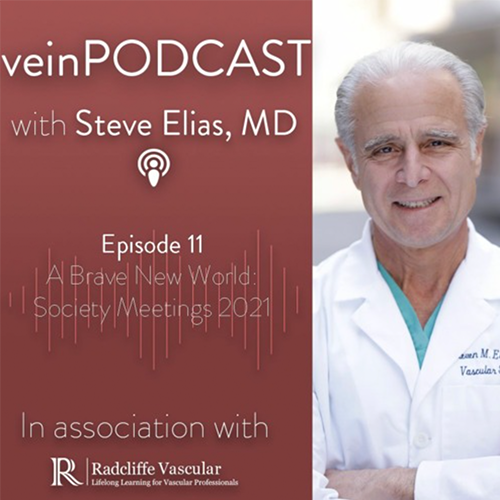
Are we in a current state of dystopia with regards to societal live meetings? Are these now a thing of the past?
In this month’s podcast episode, Steve Elias, MD is joined by executive directors from The American Venous Forum, The American Vein and Lymphatic Society, The Society of Vascular Surgery and The Society of Interventional Radiology, who together look at the current challenges for the future of society meetings and consider the steps they are taking to work towards a ‘new normal’.
In this session, they debate and discuss suggestions for innovation, as well as new engagement strategies, as they hope to embark on society meetings in a ‘Brave New World’.
In this episode they discuss:
[03.57] A look at experiences of physical meetings pre-COVID
[14.00] The next in-person meetings….when?
[27.15] The ROI for industry
[37.50] The death of the annual meeting?
[47.00] What is important to maintain?
Listen now for the latest episode from the veinPODCAST series.
Prefer video? View the vodcast video episode here.
Hosted by @DrSteveElias and produced by Radcliffe Vascular. Follow us on social media for the latest updates on the next episode @RadcliffeVASCU today!
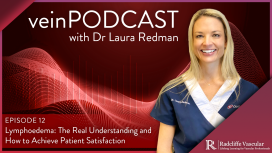
This month's episode hosted by veinPODCAST's new anchor, Dr Laura Redman (Vascular Surgeon, Cape Town, SA) features guests Prof Håkan Brorson (Plastic Surgeon, Malmö, Sweden) and Suzie Davey (Occupational/Lymphoedema Therapist, SA) to discuss issues surrounding primary and secondary lymphoedema in patients.
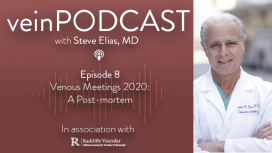
Will a phoenix rise from the ashes and what will future congress sessions look like in the future?
Non-societal representatives, Manjit Gohel (Charing Cross), Jose Almeida (IVC), Antonio Gasparis (Venous Symposium), Nicos Labroupoulos (EVM) and Prof Frank Veith (VEITH), join the discussion today to examine the issues impacting venous meetings in 2020.
Listen to them discuss the impact that COVID-19 has had on society meeting attendance this year and what’s been learnt about hosting meetings as a result. Hear them discuss the pros and cons of virtual meeting attendance and their thoughts around the challenges of postponement and reinvigoration, as they consider what the future might hold for education in 2021/22.
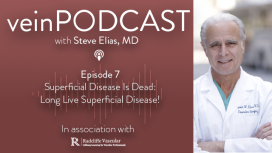
So, is superficial disease dead or not?
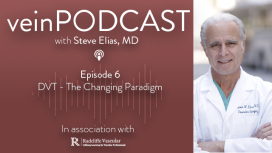
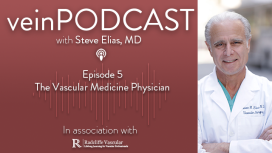
They look at a number of issues surrounding this underrepresented area of expertise, namely the importance of the relationship between the vascular surgeon, vein specialists and vascular medicine and their broad spectrum of specialities.
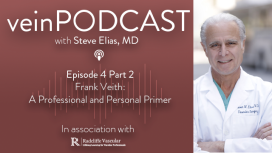
They discuss a variety of issues including the ethics of money and malpractice and the importance of educating patients on vascular surgery and vascular disease. Listen to Frank’s take on the VEITH Symposium’s success, how he’d like to see it develop in the future and why he feels interventional cardiologists and radiologists are essential for VEITH’s long-term growth.
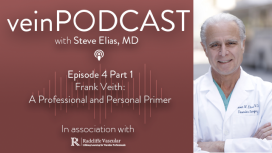
Part-one sees them discuss a variety of topics in the vascular world including the origins and growth of the VEITHsymposium™ (which is now in its 47th year!), the importance of leadership, working with cardiologists and the controversial issues around procedure abuse in medicine.
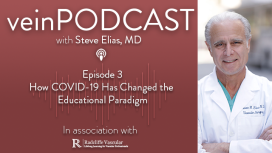
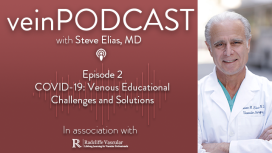
Hear them relate the impact that COVID-19 has had on various interventional procedures and the effect it’s had on the organisation and timing of key educational meetings. Finally, they express their thoughts on the long-term changes on educational paradigms that the post-COVID era may bring such as live meetings, hybrid meetings, eLearning and the use of webinar-based platforms.
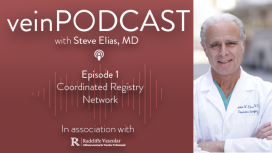
Steve Elias meets with Jens Eldruip-Jorgensen (Maine, US), Marlin Schul (Indiana, US) and Nicholas Osbourne (Michigan, US) to find out more about the aims of the Coordinated Research Network and its impact on real-world practice to treat patients with venous disease. Highlights include discussions around the benefits and challenges of registry data, as well as a look at the current data coming out from the CRN and its implications for clinicians.
Submit your questions/feedback to Steve via: podcast@radcliffe-group.com. Hosted by @DrSteveElias. Produced by @RadcliffeVASCU.
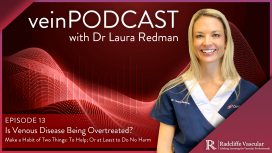
In this week's episode, host Dr Laura Redman considers the darker side of medicine to discuss whether venous disease is being treated for the right reasons and is joined by panellists, Prof Lowell Kabnick (Vascular Surgeon, US) and Dr Muhammed Zaki Shaik (Life Mount Edgemont Hospital, SA) who together discuss this topical issue with consideration for treating C2 varicose veins, venous ulcers and venous insufficiency.

This month's episode hosted by veinPODCAST's new anchor, Dr Laura Redman (Vascular Surgeon, Cape Town, SA) features guests Prof Håkan Brorson (Plastic Surgeon, Malmö, Sweden) and Suzie Davey (Occupational/Lymphoedema Therapist, SA) to discuss issues surrounding primary and secondary lymphoedema in patients.
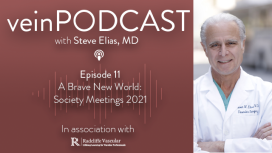
In this month’s podcast episode, Steve Elias, MD is joined by executive directors from The American Venous Forum, The American Vein and Lymphatic Society, The Society of Vascular Surgery and The Society of Interventional Radiology, who together look at the current challenges for the future of society meetings and consider the steps they are taking to work towards a ‘new normal’.
In this session, they debate and discuss suggestions for innovation, as well as new engagement strategies, as they hope to embark on society meetings in a ‘Brave New World’.
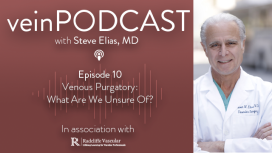
This month’s episode is ‘the podcast with all the questions but not all of the answers’ as Steve Elias, MD, and his expert guest panel including Mark Meissner, Raghu Kolluri, Manu Aggarwal and Tom O’Donnell consider the interesting questions in the grey zones of venous disease. Hear them discuss the unknowns around techniques, technology, diagnostics, therapeutics and education in venous disease and how there is so much more to understand in this exciting field of medicine.
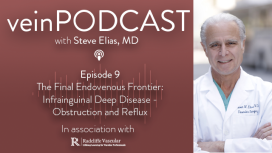
In this latest veinPODCAST episode, Steve Elias, MD, meets with an expert panel to discuss Infrainguinal Deep Venous Disease from many aspects including reflux, post-thrombotic and obstructive disease. They consider what can be done now to help patients with current knowledge and available technology and what is needed to further support treatment of this condition in the future?





